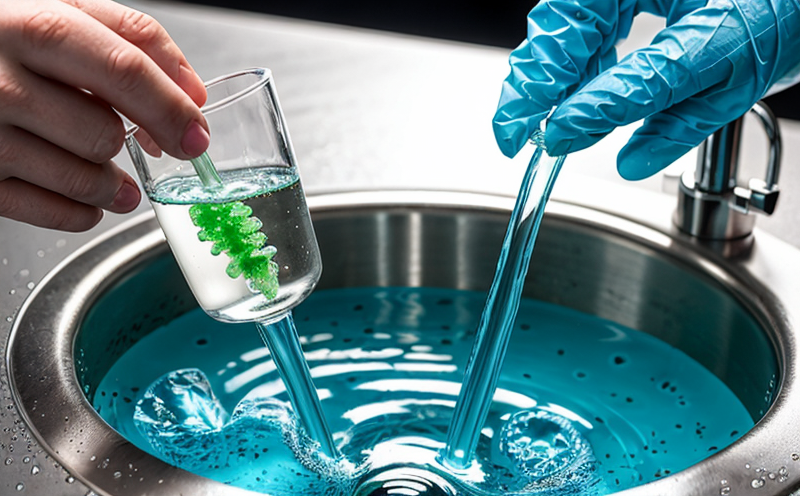ISO 10705-3 F-Specific RNA Bacteriophages Test in Water
The ISO 10705 series provides a set of international standards for the detection and enumeration of specific types of bacteriophages in water. This service focuses on F-specific RNA bacteriophages, which are particularly important indicators of faecal contamination in drinking water and wastewater.
The ISO 10705-3 standard specifically targets F-specific RNA bacteriophages, a subgroup of the larger family of coliphages. These phages are associated with human enteric viruses and their presence can indicate recent sewage discharge into water bodies. The test is crucial in ensuring public health safety by detecting potential sources of contamination before they pose risks to consumers.
The testing procedure involves the following steps:
- Sample collection from potable water supplies or wastewater streams
- Preparation and concentration of samples using appropriate methods such as filtration and adsorption techniques
- Detection of F-specific RNA bacteriophages through molecular amplification (real-time PCR)
- Confirmation by sequencing if necessary to identify the specific phage strain present
- Data analysis and reporting based on ISO 10705-3 guidelines
The primary goal is to ensure that water supplies meet strict regulatory standards for microbiological safety. This test contributes significantly to the overall water quality assurance process, helping utilities comply with international health regulations.
Implementing this procedure helps facilities maintain high standards of hygiene and sanitation. It supports compliance with both local and international guidelines such as WHO (World Health Organization) recommendations on safe drinking water practices. Furthermore, it aids in identifying and mitigating risks associated with faecal contamination early enough to prevent widespread public health issues.
The ISO 10705-3 test is not only beneficial for municipalities but also essential for industries that rely heavily on clean water sources. For instance, bottlers need assurance that the raw materials used in their production processes are free from harmful microorganisms including those indicated by F-specific RNA bacteriophages.
Incorporating this testing into routine monitoring programs ensures continuous improvement in hygiene practices within facilities. By regularly screening for these particular types of bacteriophages, operators can take proactive measures to address any detected contamination promptly and effectively.
Benefits
The implementation of the ISO 10705-3 F-specific RNA bacteriophage test in water brings numerous advantages to various stakeholders involved in managing aquatic resources:
- Enhanced Public Health Protection: Detecting F-specific RNA bacteriophages allows for early identification and mitigation strategies against potential health hazards posed by faecal contamination.
- Regulatory Compliance: Ensures that water supplies adhere to stringent microbial safety standards set forth by international organizations like WHO, thus avoiding legal penalties and reputational damage.
- Improved Water Quality Monitoring: Continuous monitoring helps maintain consistent water quality levels across different seasons or operational conditions, ensuring reliability of supply throughout the year.
- Increased Industry Confidence: For companies sourcing water from external providers, knowing that rigorous testing protocols are applied instills confidence in their suppliers' commitment to quality and safety standards.
- Cost Savings: Early detection of contamination enables targeted interventions rather than blanket treatments, thereby reducing unnecessary costs associated with over-treatment or replacement of contaminated supplies.
In summary, adopting this advanced testing method supports sustainable water management practices while safeguarding public health and protecting valuable resources.
Quality and Reliability Assurance
- Certified Laboratory: Our laboratory adheres strictly to ISO 17025 accreditation requirements ensuring accurate, reliable results every time. This certification guarantees that all our procedures follow best practices established by recognized industry bodies.
- State-of-the-Art Equipment: Equipped with the latest PCR machines capable of handling complex samples efficiently and accurately. These instruments ensure precise amplification reactions leading to robust data outputs.
- Trained Technicians: Our staff comprises highly qualified professionals who undergo regular training updates to keep abreast of technological advancements in molecular biology techniques used during testing.
- Detailed Reporting: Comprehensive reports are generated promptly after completion of each analysis, providing clear interpretations alongside supporting evidence such as graphs and charts when needed. This transparency fosters trust between clients and service providers.
We take pride in offering a robust quality assurance framework that supports consistent performance across all our services including the ISO 10705-3 F-specific RNA bacteriophage test for water samples.
International Acceptance and Recognition
The ISO 10705 series of standards has gained widespread acceptance globally among governmental bodies, private sector entities, and academic institutions alike. The international recognition of these standards stems from their robustness and alignment with global health priorities.
According to the International Organization for Standardization (ISO), ISO 10705-3 specifically addresses the need for accurate detection of F-specific RNA bacteriophages in water. The standard has been adopted by numerous countries worldwide, including those within Europe (EN standards), North America, and Asia Pacific regions.
The widespread adoption reflects its importance not just locally but internationally too. For example:
- European Union: Several EU directives mandate compliance with ISO 10705 series when it comes to monitoring water quality parameters related to microbiological safety.
- Australia/New Zealand: The Joint Accreditation Scheme (JAS) recognizes the relevance of this standard in assessing water safety indicators.
- United States: Although not mandated by federal law, many states have incorporated ISO 10705 into their own state-specific guidelines for drinking water quality assessment.
The universal applicability underscores why adhering to such standards is beneficial for any organization dealing with water resources. It ensures uniformity in approach across borders facilitating better collaboration and exchange of information between countries involved in similar activities.





